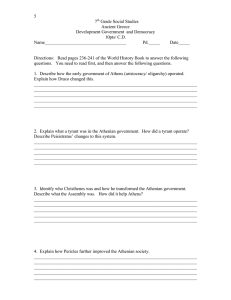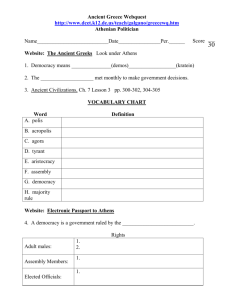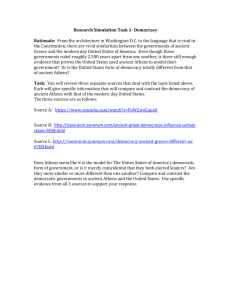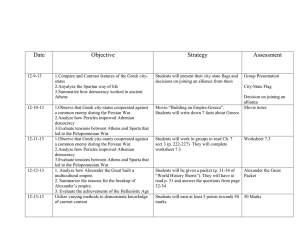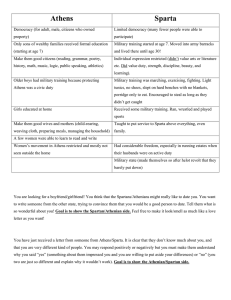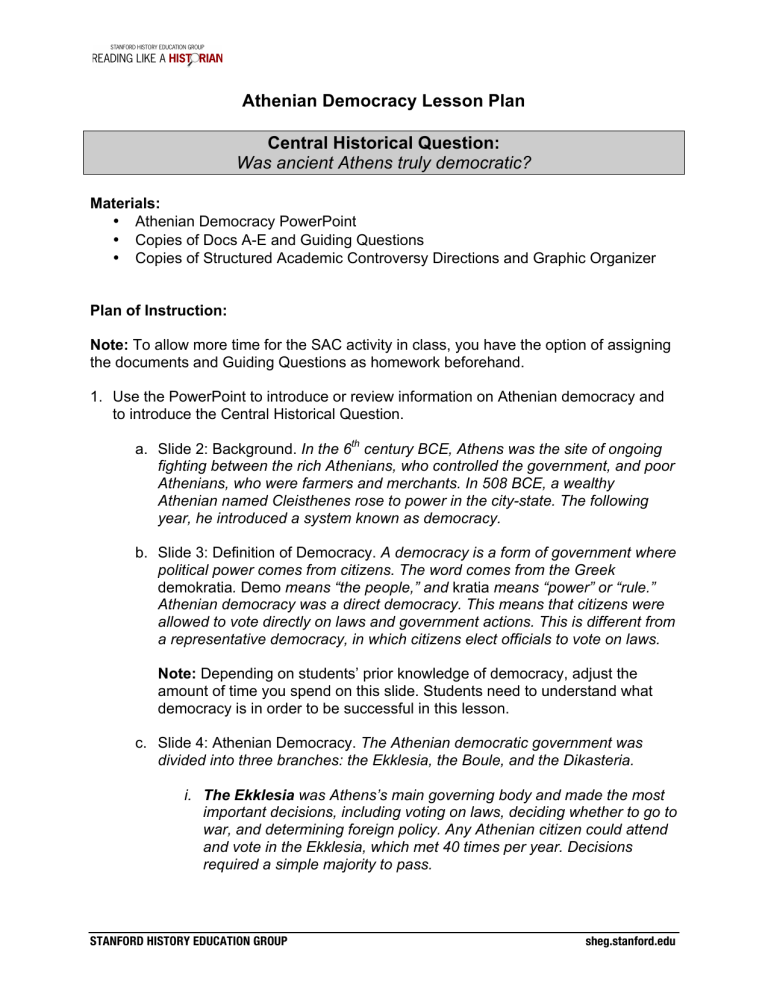
Athenian Democracy Lesson Plan Central Historical Question: Was ancient Athens truly democratic? Materials: • Athenian Democracy PowerPoint • Copies of Docs A-E and Guiding Questions • Copies of Structured Academic Controversy Directions and Graphic Organizer Plan of Instruction: Note: To allow more time for the SAC activity in class, you have the option of assigning the documents and Guiding Questions as homework beforehand. 1. Use the PowerPoint to introduce or review information on Athenian democracy and to introduce the Central Historical Question. a. Slide 2: Background. In the 6th century BCE, Athens was the site of ongoing fighting between the rich Athenians, who controlled the government, and poor Athenians, who were farmers and merchants. In 508 BCE, a wealthy Athenian named Cleisthenes rose to power in the city-state. The following year, he introduced a system known as democracy. b. Slide 3: Definition of Democracy. A democracy is a form of government where political power comes from citizens. The word comes from the Greek demokratia. Demo means “the people,” and kratia means “power” or “rule.” Athenian democracy was a direct democracy. This means that citizens were allowed to vote directly on laws and government actions. This is different from a representative democracy, in which citizens elect officials to vote on laws. Note: Depending on students’ prior knowledge of democracy, adjust the amount of time you spend on this slide. Students need to understand what democracy is in order to be successful in this lesson. c. Slide 4: Athenian Democracy. The Athenian democratic government was divided into three branches: the Ekklesia, the Boule, and the Dikasteria. i. The Ekklesia was Athens’s main governing body and made the most important decisions, including voting on laws, deciding whether to go to war, and determining foreign policy. Any Athenian citizen could attend and vote in the Ekklesia, which met 40 times per year. Decisions required a simple majority to pass. STANFORD HISTORY EDUCATION GROUP sheg.stanford.edu ii. The Boule was a council made up of 500 men (50 from each of the 10 Athenian tribes). These men were chosen by lottery and served oneyear terms. The Boule made decisions about day-to-day government and decided what issues should go in front of the Ekklesia. iii. The Dikasteria, or court, was made up of 500 men over 30 years old, who were chosen by lottery. They decided legal cases by majority rule. There were no official police or lawyers. Athenian citizens served in these roles instead. d. Slide 5: Central Historical Question. Now that we’ve learned a little about the structure of the Athenian government, we’re going to focus for the rest of the lesson on this Central Historical Question: Was ancient Athens truly democratic? You’re going to carefully read several sources about this topic and, eventually, engage with your peers in a dialogue about the question. 2. Divide students into groups of four and then divide each group of four into Team A and Team B. Pass out the Guiding Questions, Structured Academic Controversy directions, and Graphic Organizer. Instruct teams to use the Graphic Organizer to collect data for their side. If the Guiding Questions were assigned for homework in advance, students should answer them before collecting evidence for their argument. a. Team A argues ancient Athens was truly democratic, and Team B argues ancient Athens was not truly democratic b. Team A presents to Team B, and Team B repeats arguments back to Team A, until Team A is satisfied. c. Team B presents to Team A, and Team A repeats arguments back to Team B, until Team B is satisfied. d. Teams try to reach consensus. 3. Each group shares out. Discuss: a. Was ancient Athens truly democratic? b. What does democracy mean? c. In what ways was Athens democratic? d. In what ways was it not democratic? e. How does democracy in ancient Athens compare to democracy in the United States today? Citations: Document A Thucydides (c.460/455-c.399 BCE): Peloponnesian War, Book 2.34-46. In the Ancient University Sourcebook. Retrieved from http://www.fordham.edu/Halsall/ancient/periclesfuneralspeech.asp STANFORD HISTORY EDUCATION GROUP sheg.stanford.edu Document B The Athenian Constitution, written by Aristotle. Translated by Frederic G. Kenyon. Retrieved from http://classics.mit.edu/Aristotle/athenian_const.mb.txt Document C Modified from Ober, J. (2010). Wealthy Hellas. Princeton/Stanford Working Papers in Classics. Retrieved from https://www.princeton.edu/~pswpc/pdfs/ober/051001.pdf Document D Mogens, H.H. (1989). Was Athens a Democracy? Popular Rule, Liberty, and Equality in Ancient and Modern Political Thought. Copenhagen: Munksgaard. Document E John McK. Camp, “Ostracized in Athens: Ancient Greeks knew how to dump bad pols.” The New York Times, July 24, 2003. Acknowledgments We thank Professor Walter Parker at the University of Washington's College of Education for helping us see the enduring value of the SAC approach in the history classroom. STANFORD HISTORY EDUCATION GROUP sheg.stanford.edu
